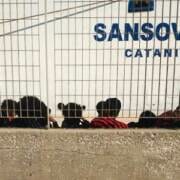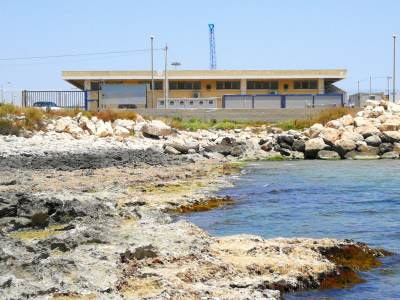Interview with Giusi Nicolini: “I, the mayor of Lampedusa, have buried 21 bodies in 6 months”
Here is the interview which was carried out with the Mayor of Lampedusa, after the publication of her letter to the European Union on 15th November.
From Linkiesta. Lidia Baratta
“Just how large exactly
does the cemetery on my island have to be?” These are the words of Giusi
Nicolini, the mayor of Lampedusa, used in an appeal addressed to the European
Union. When speaking to Linkiesta, she
said, “We have become acclimatized to immigrant deaths at sea. If the
victims were white, aboard a cruise ship, we would have even spoken about it on
talk shows.”
Giusi Nicoloini, full name
Giuseppina Maria Nicolini, has been mayor of Lampedusa since last May.
Lampedusa is the island that for many immigrants represents the gateway into Europe. In the middle, however, is the sea. It is a sea
that for many years now continues to give back the bodies of those who had
dreamed of a better life in Italy,
France, Germany or Holland.
It is important to remember as well, all the bodies that remain buried beneath
the waves. It was only on November 4th, 140 miles from the island
that 11 people lost their lives in yet another doomed crossing. “Lampedusa
has to come out of this emergency sitaution” says the mayor. In the
island’s cemetery there is no more space. For this reason Nicolini has launched
an appeal to Europe, “These deaths do not concern only Italy and
Lampedusa because they are not just ours. I want to receive a telegram of
condolence for every drowned body that comes to the island.”
Mayor,
why have you launched this appeal to Europe?
Lampedusa, in contrast with
the rest of Italy and Europe, directly lives the drama under a microscope, even
if the external perception is not the same. For us who live here, it is not
acceptable that 11 deaths (on 4th November a boat sank between Lybia and
Lampedusa, since then 11 bodies have been recovered from the sea) are not
considered newsworthy. Who knows, if we had been talking about 11 people with
white skin aboard a cruise ship, there would have been talk shows and huge
funeral processions. Yet we have grown accustomed to the images and the stories
of migrants who lose their lives while crossing the sea. I launched this appeal in order to reignite
conscience. I know we are going through a moment of serious financial crisis. But
the deaths of these people cannot go by unobserved. Since I become mayor, last
May, 21 bodies have already been delivered to me. And we don’t know the number
of people who remain at the bottom of the sea, who no one is ever going to look
for.
In
your appeal you wrote, “If these deaths remain solely Lampedusa’s
responsibility, I would like to receive a telegram of condolence for every
drowned body we receive.”
In my appeal I said that if
these deaths are solely ours then I expect telegrams of condolence for every
drowned body that we receive. And, since launching the appeal I have received a
huge number of emails of support and affection. This means that the appeal has
served a purpose and that Italy
is made up of people who also think differently.
You
were elected as the leader for Lampedusa and Linosa last May. What type of
proposals did you make on immigration?
The politics concerning immigration is not exactly the responsibility of
the Council of Lampedusa, but in my programme I focussed largely on restoring
the island’s dignity. Lampedusa’s role is not that which Roberto Maroni
condemned it to be: an island with an Immigration Detention Centre, where
migrants are held for up to 18 months whilst waiting to be repatriated.
Lampedusa is an island of rescue and reception. The immigrants who come here
should be saved and helped. Geography has assigned the role of reception to
Lampedusa and we are proud to save the lives of human beings, it is ennobling. But
in order for the First Reception Centre to function, the migrants must not be
kept for long periods of time on Lampedusa.
What
mistakes have been made in the past?
This is a problem that goes
back 15 years. There is no space left in our cemetery. Immigration cannot be
dealt with the logic of an emergency. Lampedusa has to lose its status of
emergency. From the point of view of Reception, things have improved, things
have gone forward thanks to the current government. The Minister of the
Interior Annamaria Cancellieri undertook an agreement with us which she has
upheld. Reception times have become shorter, which has enabled overcrowding in
the centres to be avoided. In the past it was overcrowding that led to
emergency situations both within and outside of the centre. The fire which
broke out in the centre in September 2011 was nothing other than an extreme
gesture. It was a direct consequence of the overcrowded conditions which the
migrants were forced to live in for long periods of time where the only outcome
was repatriation. In order for the First Reception Centre to work properly, the
migrants must not be kept for long periods of time on Lampedusa. It has to be
used only as a point of First Reception, as is legally prescribed. It is
necessary to have a rapid turnover of those arriving and those leaving the
island. The centre needs to be continually emptied. Only in this way is it
possible to guarantee dignified levels of Reception.
Why
is it addressed to Europe?
As I said before, it is
geography which has assigned Lampedusa this role. The island is the gateway to Europe and so it’s for this reason that I am addressing
the EU. Also because, the immigrants who arrive on Lampedusa don’t want to stay
in Italy.
The majority want to join other family members already living in various parts
of Europe such as Holland or Germany. It is
therefore not only Italy’s
problem or Lampedusa’s problem. The EU has an enormous responsibility. It is
common to hear phrases such as, “Let’s help them in their own
country”. Well, let’s do it then! We have to prevent these people from
putting their lives at risk in order to arrive in Lampedusa.
Many
of the people who arrive in Lampedusa are refugees or displaced people.
Yes definitely, many arrive
here in order to request political asylum. Last year, displaced people were
arriving from the war in Lybia, a war in which we also participated in. Yet no
humanitarian corridor was created in order to aid these people escape the conflict
zone. It is also necessary to highlight that these people are not arriving
unaided, in their own boats. They are people who are often rescued at high sea
by patrol boats. The previous Italian government gave money to Lybia to buy
these vessels, yet today migrants are being rescued 150 miles from Lampedusa
by the Italian coastguard not the Lybian one. The politics of the past have
failed, money was spent which has not been invested in services, in welfare, in
schools. And that’s exactly why this has a connection with the daily lives of
the rest of Italy and Europe. Let them
die- then we will have a solution? No. Lampedusa has to act as a megaphone to ask Europe for a radical revision of its immigration
policies.


